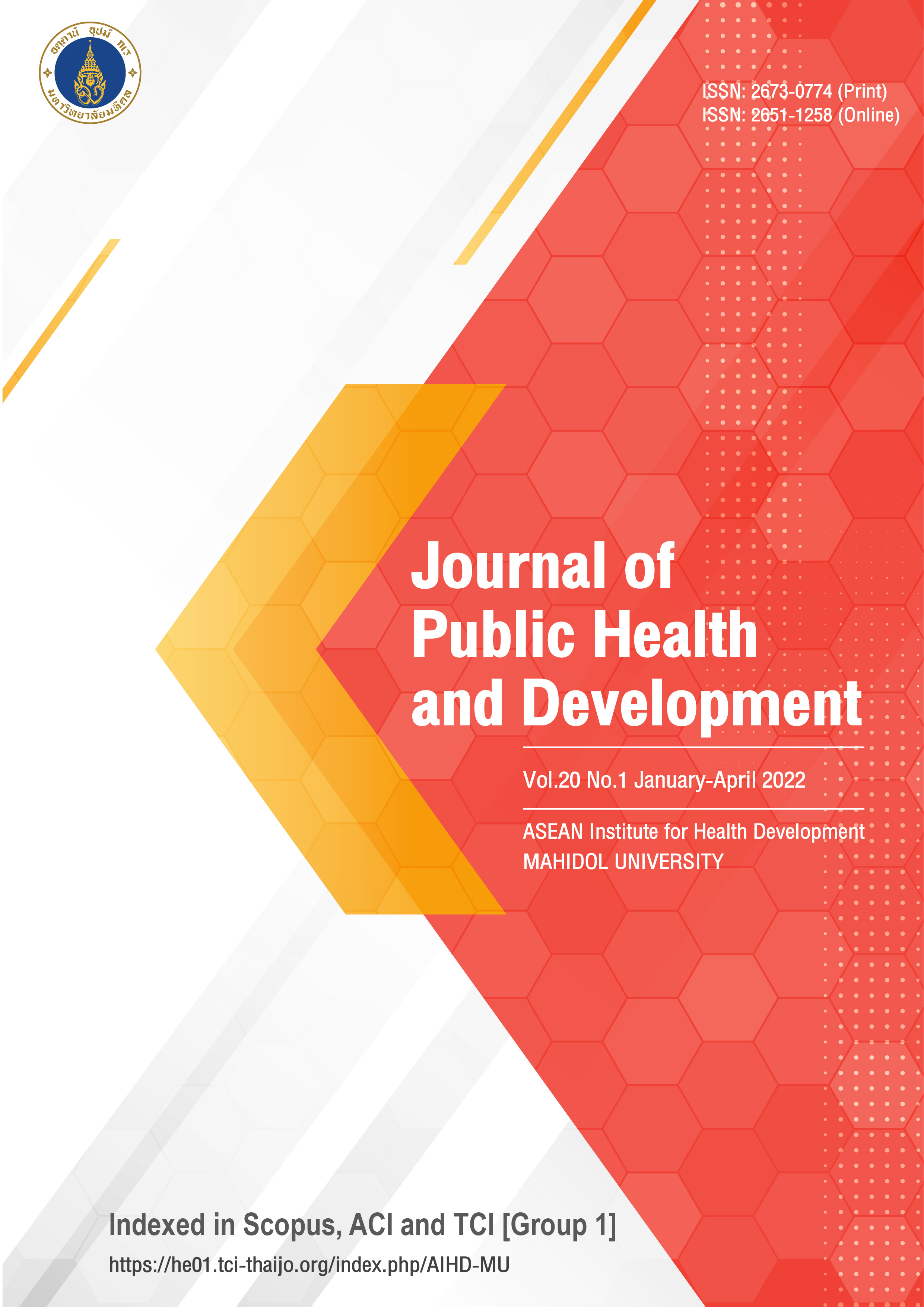Cost-effectiveness of school oral health prevention program: a case study of community dentistry, Mahidol University 10.55131/jphd/2022/200102
Main Article Content
Abstract
School may be the only place where oral health services are provided for high-risk children with limited access to dental care. We found this to be a common situation in many low-income countries, compounded by a lack of dental personnel. A school oral health prevention program is widely implemented in Thailand; however, the program's cost-effectiveness is under-investigated. This research project evaluated the cost-effectiveness of a comprehensive school oral health program implemented in the academic setting from the provider’s perspective. The retrospective study was conducted using profile data of primary school children in low socioeconomic areas during the academic years 2009–2018 from the Mahidol school oral health program database. The program's effectiveness was measured as DMFT increment scores from the first to the sixth grade between the intervention and control groups. To estimate unit costs for preventive dental services, cost data were collected according to the WHO CostIt program. The total cost was determined based on two elements: recurrent cost and capital cost.
The economic costs of the program in the 2015 academic year for first- to sixth-grade children were an average of 1,196,839.37 Baht (34,944.42 USD), comprised of recurrent costs (36.1%) and capital costs (63.9%). Personnel costs and equipment depreciation costs were a major part of recurrent costs and capital costs, respectively. Specifically, capital costs were accountable for more than half of total program costs. The incremental cost-effectiveness ratio (ICER) of the completed 5-year program compared with the control group was 4,035.31 Baht per DMFT avoided. The study findings, which suggested the effectiveness of this program, are useful for its extension and expansion. The cost-effectiveness of the oral prevention program indicated that it is worth implementing, especially for outreach and children of low socioeconomic status at high risk of caries.
Article Details

This work is licensed under a Creative Commons Attribution-NonCommercial-NoDerivatives 4.0 International License.
References
Listl S, Galloway J, Mossey P, Marcenes W. Global economic impact of dental diseases. J Dent Res. 2015;94(10):1355-61.
World Health Organization. Global Oral Health Data Bank. Geneva: WHO; 2000.
Kwan SY, Petersen PE, Pine CM, Borutta A. Health-promoting schools: an opportunity for oral health promotion. Bulletin of the World Health Organization. 2005;83:677-85.
Bagramian RA, Garcia-Godoy F, Volpe AR. The global increase in dental caries. A pending public health crisis. Am J Dent. 2009;22(1):3-8.
World Health Organization. Oral health promotion: an essential element of a health-promoting school. Geneva. 2003.
Introduction to cost analysis of health facilities. [Internet]. 1996. [cited 2010 March 10]. Available from: http: //dspace. hsri.or. th/dspace.
Cost analysis tool. Simplifying cost analysis for managers and staff of health care services. [Internet]. 2001.
Khositkaseam N. Cost-effectiveness analysis of school-based oral health preventive program at public primary school in Bangkok [Dissertation]. Chulalongkorn University; 2005.
World Health Organization. Oral health surveys: basic methods: World Health Organization. 2013.
Office of Permanent Secretary. Table of useful life years and depreciation rate of assets. 2011. Thailand: Ministry of Public Health; 2011. (Thai version).
Wennhall I, Norlund A, Matsson L, Twetman S. Cost-analysis of an oral health outreach program for preschool children in a low socioeconomic multicultural area in Sweden. Swed Dent J. 2009;34(1):1-7.
Retna K. Assessment of dental treatment required and analysis of cost in the management of dental caries among semiurban primary school children of Kerala. J Ind Soc Pedodont Prev Dent. 2000;18(1):29-37.
Luksamijarulkul N, Pongpanich S, Panza A. Protective factors for caries of a school-based oral health program in Bangkok, Thailand: a retrospective cohort study. Public Health. 2020;187:53-8.
Ministry of Public Health. The 8th national oral health survey in Thailand. 2017. Nonthaburi: Department of Health, Ministry of Public Health, Thailand. 2018.
Nguyen T, Hsueh Y-S, Morgan M, Mariño R, Koshy S. Economic Evaluation of a Pilot School–Based Dental Checkup Program. JDR Clin Trans Res. 2017;2(3):214-22.
Huang S, Ruff R, Niederman R. An economic evaluation of a comprehensive school-based caries prevention program. JDR Clin Trans Res. 2019;4(4):378-87.
Hutubessy R, Chisholm D, Edejer TT-T. Generalized cost-effectiveness analysis for national-level priority-setting in the health sector. Cost Effectiveness and Resource Allocation. 2003;1(1):8.
Pothidee T, Sringernyuang L, Tuongratanaphan S. Inequity in access to oral health service of primary students: A case study of a dental fund in a central region province. Kasetsart J Soc Sci. 2016;37(3):175-81.
Onyejaka NK, Folayan MO, Folaranmi N. Barriers and facilitators of dental service utilization by children aged 8 to 11 years in Enugu State, Nigeria. BMC Health Services Research. 2016;16(1):93.
Phenkhae Lapying VC, Prapa Sangla, Wannapa Srithong. The unit cost of pit-fissure sealing on permanent first molar in fiscal year 2007. Thai Dent Pub Health J. 2007;12(2):38-50.






